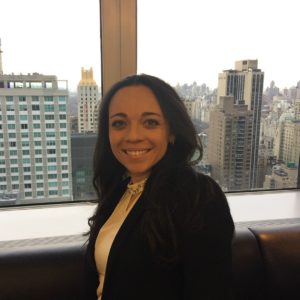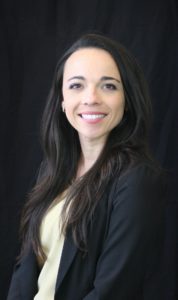
Name: Rosie Gomez
CSU Graduation Year: 2005
Degree: M.S. in Human Development and Family Studies
Bio: Rosie Gomez currently lives in Washington D.C. and has worked at the U.S. Department of Health and Human Services for the past 10 years, mostly focusing on the prevention of child abuse and neglect at the Children’s Bureau. In the last few years, she has been the lead for the Children’s Bureau on the issue of human trafficking, and last year, she was detailed to the Office of the Commissioner of the Administration of Children, Youth and Families as the Senior Policy Advisor on Trafficking Prevention. She was recently selected to participate in the Next Generation Leaders program with the McCain Institute for International Leadership. This yearlong program is designed to train and empower a diverse group of nine character-driven world leaders who are focused on human rights issues. In 2015, Gomez was awarded the CSU College of Health Sciences Emerging Leader Alumni Award.
Q: You have worked in the field of child welfare for the past 12 years. How did you become interested in this field?
I grew up in a supportive, loving family and have always believed that all children deserve a similar positive childhood experience. Although I have done volunteer work in other countries, I wanted to focus my career on some of the most vulnerable children, those in the U.S. child welfare system, or at risk of entering the system. The topic of human trafficking has been increasing in attention in the last few years, and we know that the child welfare population is at very high risk of becoming victims of human trafficking, and we must do what we can to ensure this population is given the necessary supports. A president of a large university who I met with recently talked about the importance of individuals making the choice to be life consumers or life contributors. A life contributor creates an environment of positivity, is adaptable, creative, has strong values and ethics, and contributes to the well-being of others. I knew that I wanted to be a life contributor, most especially at the national level.
Q: How did your education and experiences at CSU prepare you for your career?
At CSU, the professors who I interacted with and the classes that I completed helped reinforce the importance the healthy development of family and children can have on the communities we live in. They also taught me that social issues are often complex and can seem impossible to address, but one must have the right passion and dedication, as well as the skills to know how to think about these issues. In addition to taking classes, I was able to participate in “hands-on” projects, including program evaluation for a nonprofit organization, and an internship at a nonprofit organization in their emergency assistance program. I enjoyed this experience so much that I volunteered my time at the organization after my internship was complete. This helped me to understand that I really enjoyed this type of work, and I wanted to continue to do work that helped people.

Q: How important is the role of mentors in your career?
If you want to be a leader in your chosen field, you have to learn from others and observe their leadership styles. In the last year, I have had the opportunity to learn from some of the most influential leaders in the world, from government officials and business leaders, to those in the nonprofit space. Most successful leaders are constantly trying to better themselves and have a strong sense of their ethics and values and use them as they make important decisions. I learned that most people, even if they are very busy, are willing to talk with you about their leadership challenges and successes. And one would be surprised how many will include time on their calendar if you just reach out to them and ask.
Q: You are currently in a year-long leadership program. How has this been helpful in your work?
In addition to participating in valuable leadership training modules throughout the year, and some work directly with survivors of human trafficking, I am also working on a Leadership Action Plan, which includes creating the first public/private partnerships to address human trafficking within the child welfare population at the federal level. I believe the federal government needs to think about addressing social complex issues in new, innovative ways. This program has taught me to think differently about the issue and has provided me the time and opportunity to discuss the issue with different leaders in the field. I would encourage others to seek out opportunities throughout their career that increase their leadership skills and challenge new thinking. This has enhanced the work that I do in my agency and has provided me more expertise and knowledge so that I can have a more significant impact at the national level and ensure the continued well-being of families and children.
The Department of Human Development and Family Studies is part of CSU’s College of Health and Human Sciences.